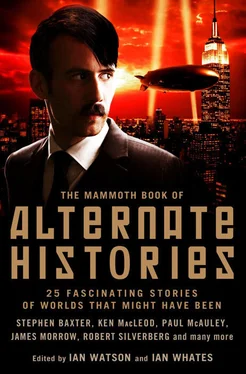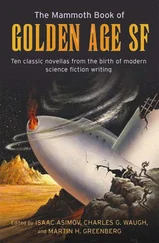7 July 1913
Lat. 9°19’N, Long. 44°42 ‘W
For reasons that defy my powers of analysis, a steady cheerfulness obtains aboard the Ada. Despite our isolation, or perhaps because of it, we’ve become quite attached to our crowded little hamlet. Notwithstanding the occasional doldrums, literal and figurative, our peripatetic tropical isle remains a remarkably congenial place.
I am aided immeasurably by the incompetence of captains who came before me. Thanks to the superfluity of wrecks, and our skill in plundering the flotsam and jetsam, we are blessed with a continual supply of fresh meat, good ale, novel toys for the children, au courant fashions for the first-cabin women, lumber for new architectural projects, rigging to improve our manoeuvrability, firearms to discourage pirates, and lambskin sheaths to curb our population. Drop by the Ada on any given Saturday night, and you will witness dance marathons, bridge tournaments, poker games, lotto contests, sing-a-longs, and amorous encounters of every variety, sometimes across class lines. We are a merry raft.
Even our library is flourishing. This last circumstance has proved especially heartening to young Harry Widener, our resident bibliophile, who needs bucking up after his parents’ divorce. Jane Austen is continually in circulation, likewise Charles Dickens, Anthony Trollope, Conan Doyle, and an epic Polish novel, at once reverent and earthy, called Quo Vadis. We also have The Oxford Book of English Verse, compiled in 1900 by Arthur Quiller-Couch, so now I need no longer pester Mr Futrelle when I wish to ornament my log with epigraphs.
At least ten weeks have passed since anybody has asked when we’re going to reach the Lesser Antilles. How might I account for this cavalier attitude to our rescue? I suspect that the phenomenon traces in part to the special editions of the New York Herald-Tribune and the Manchester Guardian that we salvaged last May. In both cases, the theme of the issue was “The Titanic Catastrophe: One Year Later”. Evidently the outside world has managed to extract a profound moral lesson from the tragedy. Man, our beneficiaries have learned, is a flawed, fallible and naked creature. Our pride is nothing of which to be proud. For all our technological ingenuity, we are not gods or even demiurges. If a person wishes to be happy, he would do better planting his garden than polishing his gaskets, better cultivating his soul than multiplying his possessions.
Given the ethos that now obtains throughout North America, Europe and the British Empire, how can we blithely go waltzing home? How dare we disillusion Western civilization by returning from the dead? I’ve consulted with representatives from steerage, amidships and the aristocracy, and they’ve all ratified my conclusion. Showing up now would amount to saying, “Sorry, friends and neighbours, but you’ve been living in a Rousseauesque fantasy, for the Titanic’ s resourceful company defeated Nature after all. Once again human cleverness has triumphed over cosmic indifference, so let’s put aside all this sentimental talk of hubris and continue to fill the planet to bursting with our contrivances and toys.”
To be sure, we also have certain personal — you might even say selfish — reasons to keep the Ada as our address. Colonel Astor, Mr Widener and Mr Guggenheim note, with great exasperation, that according to our salvaged newspapers the American Treasury Department intends to levy a severe tax on people at their level of income. (Ironically, these revenues will be due each year on the day the Titanic went down.) Reverend Bateman and Father Byles aver that their castaway flocks have proven a hundred times more attentive to the Christian message than were their congregations on dry land. At least half our married men, regardless of class, confess that they’ve grown weary of their wives back home, and many have started courting the nubile colleens from steerage. Surprisingly, some of our unescorted married women admit to analogous sentiments. Consider the case of Margaret Brown, our Denver suffragette and rabble-rouser, who avers that her marriage to J. J. Brown lost its magic many years ago, hence her proclivity for throwing herself at me in a most shocking and, I must say, exciting manner.
And, of course, we continue to expand our material amenities. Last week we put in a squash court. This morning Mr Andrews showed me his plans for a Turkish bath. Tomorrow my officers and I shall consider whether to allocate our canvas reserves to a canopy for the emigrants, analogous to the protection enjoyed by our second-cabin and forward residents. All in all, it would appear that, as captain of this community, I am obligated to defer our deliverance indefinitely, an attitude with which the vivacious Mrs Brown heartily agrees.
11 December 1913
Lat. 10°17’S, Long. 32°52’ W
Looking back on Vasil Plotcharsky’s attempt to foment a socialist revolution aboard the Ada, I would say that it was all for the best. Just as I suspected, the man is besotted with Trotsky. At first he confined his political activities to organizing marches, rallies and strikes amongst the steerage passengers and former Titanic victualling staff, his aim being to protest what he called “the tyrannical regime of Czar Henry Wilde and his decadent courtiers”. Alas, it wasn’t long before Mr Plotcharsky and his followers broke into the arms locker and equipped themselves with pistols, whereupon they started advocating the violent overthrow of my regime.
But for the intervention of our resident logic meister, Mr Futrelle, who can be as quick as his fictional Thinking Machine, Plotcharsky’s exhortations might have led to bloodshed. Instead, Futrelle explained to the Trotskyites that, per Karl Marx’s momentous revelation, the land of collectivist milk and classless honey is destined to rise only from the rubble of the Western imperialist democracies. The Workers’ Paradise cannot be successfully organized within feudal societies such as contemporary Russia or, for that matter, the good ship Ada. In due time, with scientific inevitability, the world’s capitalist economies will yield to the iron imperatives of history, but for now even the most ardent Bolshevik must practise forbearance.
Mr Plotcharsky listened attentively, spent the following day in a brown study, and cancelled the revolution. To tell you the truth, I don’t think his heart was in it.
Of course, not all of Vasil Plotcharsky’s partisans were happy with this turn of events, and one of them — a Southampton butcher named Charles Barrow — argued that we should forthwith institute a democracy aboard the Ada, as an essential first step towards a socialist Utopia. Initially I resisted Mr Barrow’s argument, whereupon he introduced his cleaver into the conversation, and I assured him that I would not stand in the way of progress.
And so a bright new day has dawned aboard the Ada. Mr Andrews’ astounding machine is now considerably more than a raft, and I am now considerably less than her captain. On 13 October, by a nearly unanimous vote, Mr Plotcharsky and Colonel Astor abstaining, we became the People’s Republic of Adaland. Our constitutional convention, drawing representatives from the aristocracy, the second-cabin precincts and steerage, dragged on for two weeks. George Widener, John Thayer and Sir Cosmo Duff-Gordon were scandalized by the resulting document, mostly because it forbade the establishment of a state church, instituted a unitary Parliament oblivious to class distinctions, and — owing to the tireless efforts of Margaret Brown and her sorority of suffragettes — enfranchised every adult female citizen. I keep trying to convince Widener, Thayer and Duff-Gordon that certain concessions to modernity are better than the Bolshevik alternative.
Читать дальше












